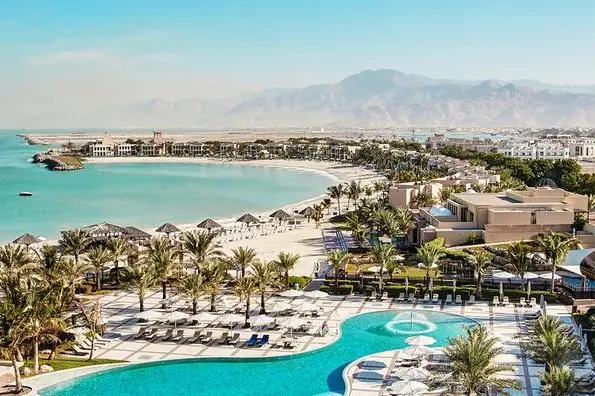PHOTO
Dubai, UAE: As Dubai prepares to welcome the world for the Conference of Parties, or COP28, in Dubai, Hilton teams across the country are gearing up to welcome delegations, host organizations supporting discussions and participate in formal conversations representing the broader hospitality industry. With a focus on driving responsible travel and tourism globally, team members at Hilton’s 35 properties in the United Arab Emirates (UAE) are working to bring Travel with Purpose, Hilton’s strategy to advance responsible travel and tourism globally, to life throughout COP28 and beyond.
In addition to participating in relevant discussions with key partners, Hilton will have a presence as part of formal COP28 Blue Zone and Green Zone panel discussions and will plan to release the results of its latest ‘Green Breakfast’ initiative as part of its COP28 activations. In support of the United Nations’ Sustainable Development Goal 12.3 and the ‘Food, Agriculture, and Water’ theme on COP28’s framework agenda, Hilton’s ‘Green Breakfast’ initiative aims to reduce food waste by 50 percent across breakfast operations in 13 UAE-based hotels in just three months.
According to the United Nations’ Environment Programme (UNEP) Food Waste Index Report 2021, an estimated 17 percent of total global food production goes to waste, of which 5 percent comes from the food service industry. Estimates suggest that 8–10 percent of global greenhouse gas emissions are associated with food that is not consumed. As a company founded on the belief that hospitality has the power to be a force for good, Hilton is committed to reducing waste across our global operations by implementing a food waste reduction program in every kitchen and taking active steps globally and within the UAE to reduce food waste across its portfolio of brands.
The ‘Green Breakfast’ initiative, currently implemented in 13 UAE-based hotels, follows the success of Hilton’s ‘Green Ramadan’ campaign launched in partnership with the United Nations Environment Program (UNEP) West Asia, Winnow and Goumbook, to implement food waste reduction efforts and improve local sourcing at hotels across the UAE, Saudi Arabia and Qatar. Hilton’s Green Ramadan campaign saw a 61 percent reduction in food waste during the Holy Month at three pilot hotels. Hilton properties across the country are actively working to measure, mitigate and minimize food waste by focusing on composting, local sourcing, sustainable gastronomy, and food donations.
Hotels are also prioritizing local sourcing, supported by a partnership with UAE-based agritech platform, Fresh on Table. Dedicated to championing local farms, Hilton expects to source over 700 tonnes of local produce annually in the UAE, thereby reducing its carbon impact, supporting the community and providing guests with fresh, delicious food.
UAE Hotels Bringing Travel with Purpose to Life
Each Hilton property, in alignment with our overarching Travel with Purpose strategy, also chooses unique ways to leave a positive impact in their communities and reduce food waste at their properties, whether that’s repurposing food waste, prioritizing local sustainable sourcing or food and beverage programs that have a positive ecological impact. Some UAE hotels have successfully received the ‘Dubai Sustainable Tourism Stamp’, a sustainable initiative that seeks to recognize hotels adhering to Dubai’s Department of Economy and Tourism (DET) sustainability requirements, while others are working towards receiving the same.
In Dubai, Conrad Dubai, one of the three Green Ramadan pilot hotels, is working with sustainability start-up The Waste Lab to convert food scraps into organic fertilizers. The hotel is also currently in the process of planting 350 Ghaf trees on the property – one for each Team Member – to contribute to the region’s biodiversity. While DoubleTree by Hilton – Business Bay is giving new life to coffee grounds by turning them into fertilizers to grow mushrooms, in partnership with mushroom farm Bean and Beyond Farm. Hilton Garden Inn Dubai Mall of the Emirates holds a LEED Platinum Certificate earned through several initiatives including water recycling systems and the integration of solar thermal panels.
Abu Dhabi-based hotels are leading the way in hotel farming. The Chef’s Garden at Hilton Abu Dhabi Yas Island boasts guava trees and an abundance of fresh fruits and vegetables including mango, fig, chikoo, and pomegranate. Meanwhile, at Conrad Abu Dhabi Etihad Towers, the hotel tends to its own zero-waste hydroponic farm which generates 10 kilograms of local produce every day for 12 restaurants. In addition, beehives will soon be housed at Hilton Abu Dhabi Yas Island to support the island’s ecosystem and provide guests with fresh local honey.
Moving to the Northern Emirates, in Fujairah, DoubleTree by Hilton Fujairah City has created a Sustainability Garden using repurposed wood and plastic bottles for tree planting and integrates an aquaponics system to conserve water. In addition, in Ras Al Khaimah – the pearl of the Emirates - Hilton Ras Al Khaimah Beach Resort features an organic garden that grows a variety of homegrown fruits and vegetables. From tomatoes and eggplants to chillies and capsicums, the garden offers produce that serves as the foundation for the resort’s Farm to Table concept.
In Sharjah, DoubleTree by Hilton Sharjah Waterfront Hotel & Residences has put in place management systems to save energy and electricity. Water saver aerators are also installed across the hotel to reduce consumption and ensure a sustainable and comfortable stay.
In support of Hilton’s efforts to create engines of opportunity in the communities where it operates, Hilton Global Foundation (HGF) – Hilton’s primary philanthropic arm –announced a commitment to grant USD $250,000 to the SEDRA Foundation as part of its global funding towards organizations that are making a tangible impact in their communities. Through this partnership, Hilton aims to offer training to support young people with disabilities. As a result, three team members have joined Conrad Abu Dhabi Etihad Towers.




















